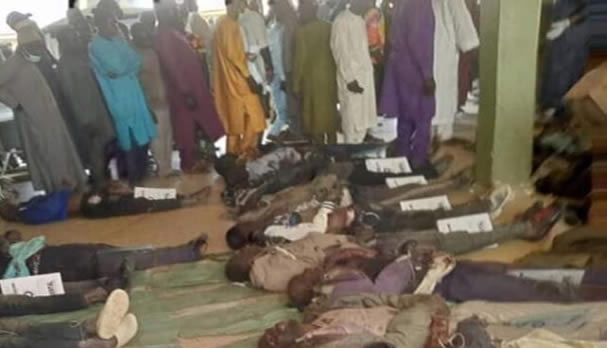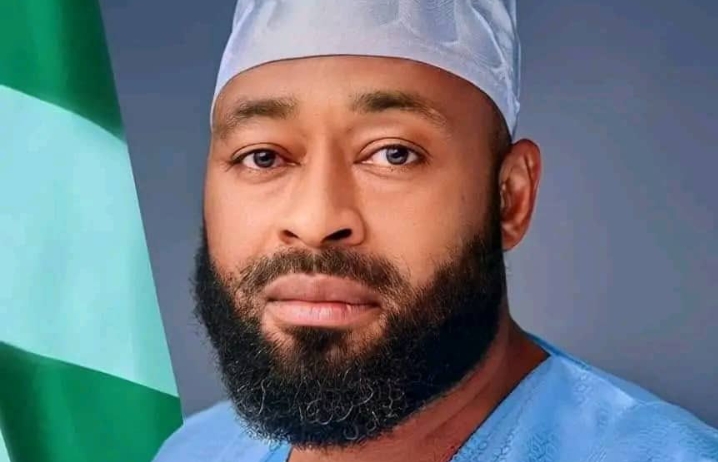EXCITING NEWS: TNG WhatsApp Channel is LIVE…
Subscribe for FREE to get LIVE NEWS UPDATE. Click here to subscribe!
Terrorism remains a serious threat in Nigeria and the killing of scores of local vigilantes in Bakori and Kankara local government areas of Katsina State is yet another setback in the war against insurgency.
The local vigilantes known as Yansakai, drawn from 11 villages were on a mission to recover 50 cows and 20 sheep rustled by some terrorists after they attacked the house of one Alhaji Muntari, at Unguwar Audu Gare, Kandarawa, in Bakori on Thursday when they were brutally murdered at Yargoje Forest.
TheNewsGuru.com (TNG) gathered that the terrorists planned and launched a coordinated ambush on the Yansakai, killing over 41 members whose corpses were later recovered by a team of policemen, while others injured were taken to Kankara General Hospital for treatment.
In a statement signed by a presidential media aide Garba Shehu, on Sunday, President Muhammadu Buhari condemned the massacre of the members of the vigilante group killed in his home state, describing them as martyrs.
“Our thoughts and prayers are with the bereaved families in this difficult period. May Allah repose the soul of the deceased,” the president said.
The Nigerian government had promised to eliminate all terrorists by December 2022, and assured citizens that the worst days for terrorism attacks were over.
However, the Katsina massacre coming barely two weeks after at least 30 vigilantes were reportedly killed in an air raid by a yet-to-be-identified aircraft in Galadima Kogo, a community in Shiroro Local Government Area, Niger State, indicates otherwise.
In a pattern similar to the Katsina incident, the Niger state local vigilante members were bombed as they were preparing to counter an attack against terrorists who had earlier attacked their community and kidnapped several villagers as well as rustled several herds of cattle.
The state Police Public Relations Officer Gambo Isah said an investigation into the killings was currently ongoing with a view to investigating the immediate and remote causes of the killings and bringing the perpetrators to book.
Reacting to the killings, the security adviser to the state government Ibrahim Katsina, said the incident had come as a “rude shock” and upturned previous successes recorded in the fight against insurgency in the country.
“This incident had come to us as a rude shock, very sad and unfortunate that is why besides sympathising with the victims and their families, the state government is going to do the needful by ensuring that it unmasked the factors responsible for the,” he said.
Reports of kidnappings and violent killings perpetrated by bandits and Boko Haram terrorists have continued unabated, despite claims of the Buhari-led administration that it had dislodged members of the group.
Some analysts have argued that the collapse of security architecture in the country was due to the diversion of the huge fund earmarked for the procurement of arms and ammunition for the armed forces and the police by successive regimes.
Former Minister of State for Defence, Olu Agunloye, said the invitation of U.S. and other foreign nations is a welcome development because Nigeria has been mismanaged and now faces very critical problems that can lead to its total collapse. According to him, when you are faced with issues that can become permanently irreversible, then you have to swallow your pride and look for help from everywhere.
“The security crisis has gone beyond us, we must go back to the Americans to bring back ARFICOM, because the reason we said we don’t want it before was at the point when we were in a position of strength. This latest decision is not a sign of weakness but a matter of last grasp effort because the leadership has messed things up.”
The National President of the Association of Licensed Private Security Practitioners of Nigeria (ALPSPN), the umbrella body of all registered and licensed private security companies in the country, Davidson Aikhmen, said Nigeria had the resources to curtail terrorism but pointed out there was a lack of political leadership to deal decisively with criminal elements.
Meanwhile, the World Bank has predicted that Nigeria’s economy will experience a slower growth of 2.9 per cent in 2023, compared to the 3.8 per cent last year, as a result of the downturn witnessed in the oil sector and rising insecurity.
The Bank noted in its recently released Global Economic Prospects report that increased insecurity had worsened Nigeria’s fragility and is expected to reduce access to food for many more people across the region.









